核电站的优点和缺点
核电站的优点和缺点
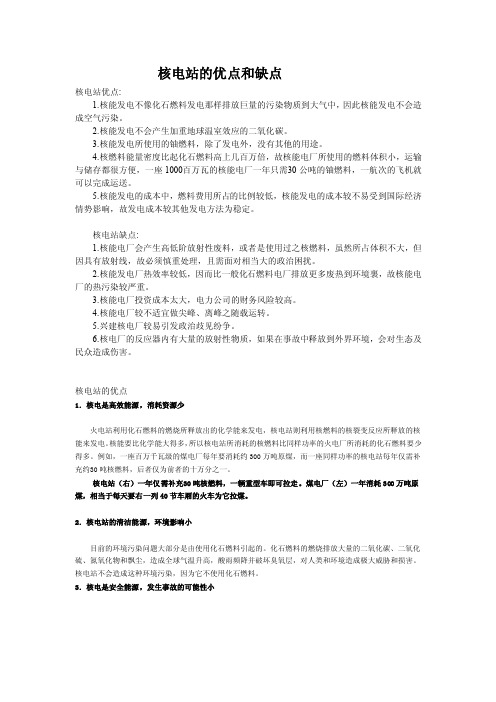
核电站的优点和缺点核电站优点:1.核能发电不像化石燃料发电那样排放巨量的污染物质到大气中,因此核能发电不会造成空气污染。
2.核能发电不会产生加重地球温室效应的二氧化碳。
3.核能发电所使用的铀燃料,除了发电外,没有其他的用途。
4.核燃料能量密度比起化石燃料高上几百万倍,故核能电厂所使用的燃料体积小,运输与储存都很方便,一座1000百万瓦的核能电厂一年只需30公吨的铀燃料,一航次的飞机就可以完成运送。
5.核能发电的成本中,燃料费用所占的比例较低,核能发电的成本较不易受到国际经济情势影响,故发电成本较其他发电方法为稳定。
核电站缺点:1.核能电厂会产生高低阶放射性废料,或者是使用过之核燃料,虽然所占体积不大,但因具有放射线,故必须慎重处理,且需面对相当大的政治困扰。
2.核能发电厂热效率较低,因而比一般化石燃料电厂排放更多废热到环境裏,故核能电厂的热污染较严重。
3.核能电厂投资成本太大,电力公司的财务风险较高。
4.核能电厂较不适宜做尖峰、离峰之随载运转。
5.兴建核电厂较易引发政治歧见纷争。
6.核电厂的反应器内有大量的放射性物质,如果在事故中释放到外界环境,会对生态及民众造成伤害。
核电站的优点1.核电是高效能源,消耗资源少火电站利用化石燃料的燃烧所释放出的化学能来发电,核电站则利用核燃料的核裂变反应所释放的核能来发电。
核能要比化学能大得多,所以核电站所消耗的核燃料比同样功率的火电厂所消耗的化石燃料要少得多。
例如,一座百万千瓦级的煤电厂每年要消耗约300万吨原煤,而一座同样功率的核电站每年仅需补充约30吨核燃料,后者仅为前者的十万分之一。
核电站(右)一年仅需补充30吨核燃料,一辆重型车即可拉走。
煤电厂(左)一年消耗300万吨原煤,相当于每天要右一列40节车厢的火车为它拉煤。
水电站与核电站的差异

水电站与核电站的差异
水电站和核电站都是重要的发电方式,但它们在很多方面都存在明显的差异。
以下是一些关于水电站和核电站的差异:
能源来源:水电站利用水能转化为电能,而核电站则是利用核能进行发电。
发电效率:在发电效率方面,核电站由于使用核能进行发电,因此其发电效率相对较高。
然而,水电站的发电效率会受到水资源量的影响,如果水资源不足,发电效率可能会受到影响。
环保性:水电站是一种相对环保的发电方式,不会产生明显的污染物。
然而,核电站会产生放射性废料,处理这些废料需要严格的安全措施,如果处理不当,可能会对环境和人类健康造成威胁。
建设成本:在建设成本方面,核电站的建设成本通常较高,因为需要考虑到放射性废料的处理和安全问题。
而水电站的建设成本相对较低,但需要考虑自然环境的影响,如洪水、干旱等。
运行维护:在运行维护方面,核电站需要专业的技术人员进行管理和维护,以确保安全运行。
水电站则需要对水道和水库进行维护和管理,以确保水能的正常转化。
总的来说,水电站和核电站各有其优缺点,选择哪种方式需要根据实际情况和需求进行判断。
在选择发电方式时,需要考虑能源来源、发电效率、环保性、建设成本以及运行维护等因素。
核能发电
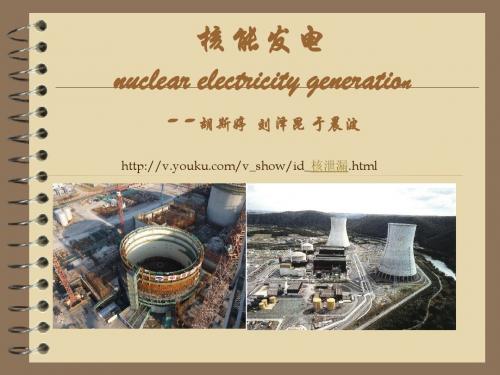
核能发电的优缺点
优点 1.核能发电不像化石燃料发电那样排放巨量的污染物质 到大气中,因此核能发电不会造 成空气污染。 核能发电不会产生加重地球温室效应的二氧化碳。 核能发电所使用的铀燃料,除了发电外,没有其他的 用途。 核燃料能量密度比起化石燃料高上几百万倍,故核能 电厂所使用的燃料体积小,运输与储存都很方便,一 座1000百万瓦的核能电厂一年只需30公吨的铀燃料, 一航次的飞机就可以完成运送。 核能发电的成本中,燃料费用所占的比例较低,核能 发电的成本较不易受到国际经济情势影响,故发电成 本较其他发电方法为稳定。
(2)中子反射层。用来阻挡中于飞出活性区,以减少 中子的损失,一般用石墨或氧化铍。 (3)控制调节系统。链式反应的速度很快,大约每秒 钟可产生1千代中子,如果不加以控制,在极短的时间 内释放巨大的能量使铀爆炸,这就是原子弹。因此控 制调节系统是反应堆中很关键的部分,用它来控制链 式反应的速度,调节反应堆的功率,使反应堆开始或 停止工作等。 调控系统主要是由吸收中子很强的 物质镉或硼制成的控制棒和相应的自动控制系统组成。 当反应强烈时,反应堆中的控制棒将插入的深一些, 使被吸收的中子增多,因而链式反应减慢;反之,将 控制棒从活性区向外拉出一些,反应速度将加快。
热中子堆的主要缺点是核燃料利用率很低,在开 采精炼出来的 天然铀中,只 有大约1~2 %的核燃料能够 在热中子 堆中产生核能,其 余约98-99% 的铀-238都将 积压下来, 要等到快中子堆 才加以利 用。 快中子堆最大 的优点就是 能够充分利用 核燃料,它在 铅冷快反应堆 消耗裂变燃料来产生核能的同时,还能够产生相 当于消耗量1.2~1.6倍的裂变燃料,使得热堆积压 下来的铀-238的60~70%能在快堆中利用。
核能发电调研报告

中国核电发展调研报告 一、前言 核工业是20 世纪产生和发展起来的新兴产业,是一个十分复杂和庞大的系统工程,其组成体系包括:铀矿勘探、铀矿开采与铀的提取、燃料元件制造、铀同位素分离、反应堆发电、乏燃料后处理、同位素应用以及与核工业相关的建筑安装、仪器仪表、设备制造与加工、安全防护及环境保护。
进入新世纪以后,在“积极推进核电发展”方针的指导下,中国政府制定了核电“2020年建成4000万千瓦,在建1800万千瓦”的规划目标,核电进入一个快速发展的阶段。
2005年以来,在国家的支持下,广东、浙江、辽宁、福建、山东等沿海地区正在建设一批新的核电站,与此同时,在电力需求的强力推动下,湖北、湖南、江西、安徽、四川、重庆等内陆省市也在竞相成为我国第一批内陆核电站的所在地,过去几十年只能在沿海地区发展核电的格局正在被打破,核电建设正向我国内陆地区迈进。
2008年初,突如其来的冰雪灾害进一步引起政府的思考,加大了发展核电的决心,且有大大增加原定规划目标的迹象。
本报告介绍了世界以及我国核电的发展概括,并引入了核电的相关概念进行描述,提出了我国核电建设的部分问题并给出个人的建议。
作为电力大学的学生,我们更应该了解我国的电力行业,尤其是越来越受到重视,争议颇多的核电行业。
在我国能源的消费格局中,长期以煤为主(占总能源的74%)。
相比较我国能源的消耗速度,煤资源的数量相对不充裕。
据计算,如果维持我国煤的消耗占总能耗的70%水平估算,则2050年煤的年消耗量将达50亿t。
到下世纪60年代,我国可以经济开采的煤将开采完毕。
由于燃煤所带来的污染问题和运输问题也逐渐成为阻碍我国经济和社会可持续发展的大问题。
另外,虽然我国可开发的水能资源列世界第一,但我国人均水能资源只及世界人均值的一半。
由于我国水能资源大多集中在西南地区,而且地质条件复杂,能经济开发的水能资源不到总资源的一半。
即使到2050年可经济开发的水能资源都开发完毕,也不到2亿kw,只相当于2亿多t标准煤。
常识备考:你对“核能”知多少?
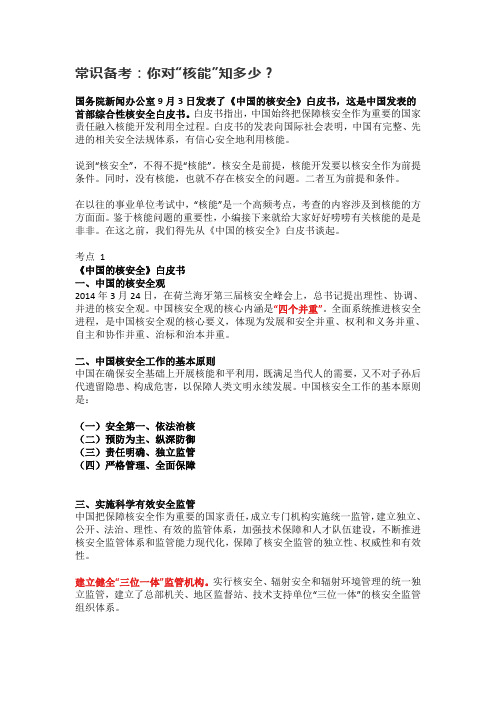
常识备考:你对“核能”知多少?国务院新闻办公室9月3日发表了《中国的核安全》白皮书,这是中国发表的首部综合性核安全白皮书。
白皮书指出,中国始终把保障核安全作为重要的国家责任融入核能开发利用全过程。
白皮书的发表向国际社会表明,中国有完整、先进的相关安全法规体系,有信心安全地利用核能。
说到“核安全”,不得不提“核能”。
核安全是前提,核能开发要以核安全作为前提条件。
同时,没有核能,也就不存在核安全的问题。
二者互为前提和条件。
在以往的事业单位考试中,“核能”是一个高频考点,考查的内容涉及到核能的方方面面。
鉴于核能问题的重要性,小编接下来就给大家好好唠唠有关核能的是是非非。
在这之前,我们得先从《中国的核安全》白皮书谈起。
考点1《中国的核安全》白皮书一、中国的核安全观2014年3月24日,在荷兰海牙第三届核安全峰会上,总书记提出理性、协调、并进的核安全观。
中国核安全观的核心内涵是“四个并重”。
全面系统推进核安全进程,是中国核安全观的核心要义,体现为发展和安全并重、权利和义务并重、自主和协作并重、治标和治本并重。
二、中国核安全工作的基本原则中国在确保安全基础上开展核能和平利用,既满足当代人的需要,又不对子孙后代遗留隐患、构成危害,以保障人类文明永续发展。
中国核安全工作的基本原则是:(一)安全第一、依法治核(二)预防为主、纵深防御(三)责任明确、独立监管(四)严格管理、全面保障三、实施科学有效安全监管中国把保障核安全作为重要的国家责任,成立专门机构实施统一监管,建立独立、公开、法治、理性、有效的监管体系,加强技术保障和人才队伍建设,不断推进核安全监管体系和监管能力现代化,保障了核安全监管的独立性、权威性和有效性。
建立健全“三位一体”监管机构。
实行核安全、辐射安全和辐射环境管理的统一独立监管,建立了总部机关、地区监督站、技术支持单位“三位一体”的核安全监管组织体系。
全天候监测辐射环境。
建立国家、省和市三级辐射环境监测体系,建成全国辐射环境质量监测、重点核设施周围辐射环境监督性监测和核与辐射应急监测“三张网”,实现辐射环境全覆盖全天候监控。
核能发电的优点及世界核电发展动向
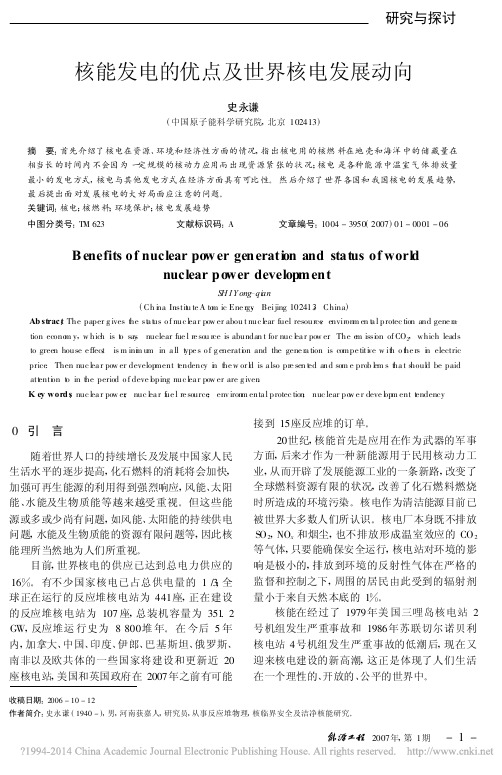
2007年,第1期 -1 -收稿日期:2006-10-12作者简介:史永谦(1940-),男,河南获嘉人,研究员,从事反应堆物理,核临界安全及洁净核能研究。
核能发电的优点及世界核电发展动向史永谦(中国原子能科学研究院,北京102413)摘 要:首先介绍了核电在资源、环境和经济性方面的情况,指出核电用的核燃料在地壳和海洋中的储藏量在相当长的时间内不会因为一定规模的核动力应用而出现资源紧张的状况;核电是各种能源中温室气体排放量最小的发电方式,核电与其他发电方式在经济方面具有可比性。
然后介绍了世界各国和我国核电的发展趋势,最后提出面对发展核电的大好局面应注意的问题。
关键词:核电;核燃料;环境保护;核电发展趋势中图分类号:TM 623 文献标识码:A 文章编号:1004-3950(2007)01-0001-06B enefits of nuclear po w er generati on and status of worl dnuclear po wer develop mentS H I Y ong -qi an(Ch i na Instit u te A to m ic Ene rgy ,Beijing 102413,China )Ab strac t :The paper g ives t he st a t us o f nuc l ea r pow er abou t nuc l ear fuel resource ,environ m en t a l protec tion and gene ra -tion econo m y ,w hich is t o say ,nuclear fue l re sou rce is abundan t for nuc l ea r pow er .The e m issi on of CO 2,which leads to green house e ffect ,is m ini m u m in a ll t ype s o f g enerati on and the gene ra tion is compe titi ve w it h o t he rs i n electric price .Then nuc l ea r pow er develop ment t endency i n t he w or l d is a lso pre sen t ed and som e prob l em s t ha t s houl d be paid att enti on t o in t he period o f deve l oping nuc l ea r pow er are g iven .K ey word s :nuc l ea r pow er ;nuc l ea r f ue l re source ;env iron m enta l protec tion ;nuc lear po w e r deve l op m ent t endency0 引 言随着世界人口的持续增长及发展中国家人民生活水平的逐步提高,化石燃料的消耗将会加快,加强可再生能源的利用得到强烈响应,风能、太阳能、水能及生物质能等越来越受重视。
核电行业ppt课件

国际核电保险共同体(INES)
是一个国际性的核电保险组织,为全球核电站提供保险服务,分摊风 险。
05
核电的经济与社会 影响
核电的经济性分析
核电的经济性
核电是一种低成本、高效率的能 源供应方式,能够为国家和地区 的经济发展提供稳定的电力支持 。
安全管理
核电站运营过程中需严格遵守安全规定,确保放射性物质得到妥善 管理和控制。
维护与检修
定期对核电站进行维护和检修,确保其设备处于良好状态,延长使 用寿命。
人员培训
对核电站工作人员进行专业培训,提高其技能和素质,确保核电站的 安全稳定运行。
核电站退役与废物处理
退役计划
核电站运行达到设计寿命后,需制定详细的退役计划,确保放射性物质得到妥 善处理和处置。
应对措施
加强应急预案制定和演练, 提高应对核事故的能力;加 强国际合作,共同应对核安 全挑战。
国际核电安全标准与合作
国际原子能机构(IAEA)
是全球核能领域的权威机构,负责制定和推广国际核电安全标准。
核能机构间合作组织(ICRP)
是一个国际性的核能合作组织,致力于推动全球核电安全和可持续发 展。
国际核电安全审查团(IRSG)
近年来,随着气候变化和能源安全问题的 日益严峻,核电重新受到重视,许多国家 开始加大核电投资和研发力度。
核电的优势与挑战
优势
核电作为一种高效、清洁、可靠的能源,具有稳定供电、节能减排、促进经济发展等优点。
挑战
核电建设和运营过程中存在安全、核废料处理、公众接受度等问题,同时核电技术研发和设备制造也面临诸多挑 战。
核电行业ppt课件
核电站的优点和缺点是什么英语作文
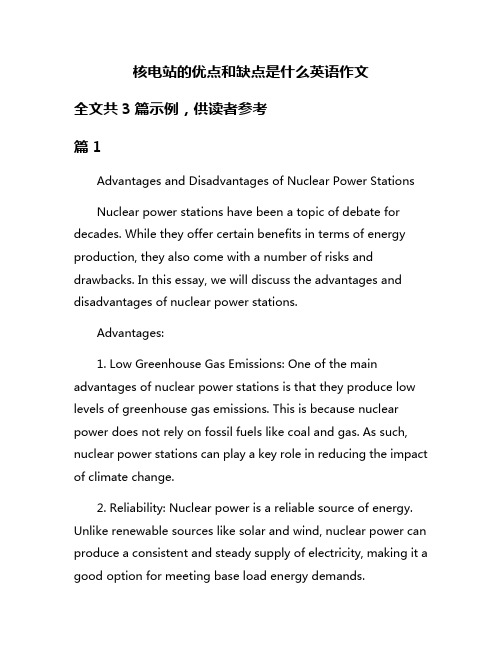
核电站的优点和缺点是什么英语作文全文共3篇示例,供读者参考篇1Advantages and Disadvantages of Nuclear Power StationsNuclear power stations have been a topic of debate for decades. While they offer certain benefits in terms of energy production, they also come with a number of risks and drawbacks. In this essay, we will discuss the advantages and disadvantages of nuclear power stations.Advantages:1. Low Greenhouse Gas Emissions: One of the main advantages of nuclear power stations is that they produce low levels of greenhouse gas emissions. This is because nuclear power does not rely on fossil fuels like coal and gas. As such, nuclear power stations can play a key role in reducing the impact of climate change.2. Reliability: Nuclear power is a reliable source of energy. Unlike renewable sources like solar and wind, nuclear power can produce a consistent and steady supply of electricity, making it a good option for meeting base load energy demands.3. High Energy Density: Nuclear power has a high energy density, meaning that it can produce a large amount of energy from a relatively small amount of fuel. This makes nuclear power stations efficient and cost-effective in terms of energy production.4. Energy Security: Nuclear power stations can help to enhance energy security by reducing dependence on imported fossil fuels. This can help to stabilize energy prices and reduce the risk of supply disruptions.Disadvantages:1. Nuclear Accidents: Perhaps the biggest drawback of nuclear power stations is the risk of accidents. Events like the Chernobyl and Fukushima disasters have highlighted the potential dangers of nuclear power. Even though modern nuclear reactors are designed to be safe, accidents can still occur due to human error or natural disasters.2. Radioactive Waste: Nuclear power stations produce radioactive waste that remains hazardous for thousands of years. Proper disposal of this waste is a major challenge, as it poses a risk to both human health and the environment. The long-term storage of radioactive waste is a key concern for the nuclear industry.3. High Costs: Building and operating nuclear power stations can be expensive. The initial capital costs of constructing a nuclear plant are high, and there are also significant costs associated with decommissioning old plants and managing radioactive waste. This can make nuclear power lesscost-effective compared to other forms of energy generation.4. Public Perception: Nuclear power stations face resistance from the public due to safety concerns and the association with nuclear weapons. The perceived risk of nuclear accidents has led to public opposition to the expansion of nuclear power, making it difficult to gain public acceptance for new nuclear projects.In conclusion, nuclear power stations have both advantages and disadvantages. While they offer benefits in terms of low greenhouse gas emissions, reliability, and energy security, they also come with risks such as nuclear accidents, radioactive waste, high costs, and public opposition. It is important to weigh these advantages and disadvantages carefully when considering the role of nuclear power in the energy mix. Only by addressing these challenges can nuclear power stations be a sustainable and viable option for meeting global energy needs.篇2Advantages and Disadvantages of Nuclear Power PlantsNuclear power plants have been a topic of debate for many years, with proponents touting their efficiency and low carbon emissions, while opponents cite concerns about safety and long-term waste disposal. In this essay, we will explore the advantages and disadvantages of nuclear power plants.Advantages:1. Low carbon emissions: One of the biggest advantages of nuclear power plants is that they produce very low amounts of carbon emissions compared to traditional fossil fuel power plants. This makes them a more environmentally friendly option for producing electricity.2. High efficiency: Nuclear power plants are known for their high efficiency in producing electricity. They are able to generate large amounts of energy with a relatively small amount of fuel, making them a cost-effective option in the long run.3. Reliability: Nuclear power plants are known for their reliability and ability to provide a consistent source of electricity. They can operate for long periods of time without interruption, unlike renewable energy sources such as wind or solar power.4. Energy security: Nuclear power plants provide a source of energy that is not dependent on foreign sources of oil or gas. This can help countries maintain energy security and reduce their reliance on imports.5. Long lifespan: Nuclear power plants have a long lifespan, with some plants operating for 40 years or more. This means that once a nuclear power plant is built, it can provide a stable source of electricity for decades to come.Disadvantages:1. Safety concerns: One of the biggest disadvantages of nuclear power plants is the potential for accidents and meltdowns, as seen in disasters such as Chernobyl and Fukushima. These accidents can result in catastrophic consequences for both human health and the environment.2. Radioactive waste: Another major disadvantage of nuclear power plants is the issue of radioactive waste disposal. The spent fuel rods and other radioactive materials produced by nuclear reactors must be carefully stored and managed for thousands of years, posing a long-term environmental and health risk.3. High initial costs: Building a nuclear power plant is a costly endeavor, with high upfront costs for construction and licensing.This can make nuclear power plants less economically viable compared to other energy sources.4. Limited fuel supply: While nuclear power plants do not produce greenhouse gas emissions, they rely on a limited supply of uranium for fuel. As demand for nuclear energy grows, there may be concerns about the availability and cost of uranium in the future.5. Public perception: Finally, public perception of nuclear power plants is often negative due to concerns about safety and waste disposal. This can make it difficult to build new nuclear power plants and can hinder the growth of nuclear energy as a viable option for electricity generation.In conclusion, nuclear power plants have both advantages and disadvantages, and the decision to build or expand nuclear energy capacity should be carefully considered taking into account these factors. While nuclear power plants offer alow-carbon and high-efficiency source of electricity, concerns about safety, waste disposal, and cost must also be taken into consideration.篇3Advantages and Disadvantages of Nuclear Power PlantsNuclear power plants have been a source of controversy for many years due to their inherent risks and benefits. In this essay, I will discuss the advantages and disadvantages of nuclear power plants.Advantages:1. Low Greenhouse Gas Emissions: One of the key advantages of nuclear power plants is that they produce very low greenhouse gas emissions compared to traditional fossil fuels like coal and natural gas. This makes them an important tool in the fight against climate change.2. Reliable and Stable Source of Energy: Nuclear power plants are a reliable source of energy that can provide electricity on a consistent basis regardless of external factors like weather conditions. This makes them essential for ensuring energy security and stability in a country.3. High Energy Density: Nuclear power plants have a high energy density, which means that they can produce a large amount of electricity from a small amount of fuel. This makes them an efficient way to generate power and can help reduce energy costs.4. Long Operating Life: Nuclear power plants have a long operating life compared to other forms of energy generation, which means that they can provide electricity for many decades after they are built. This makes them a long-term solution to energy needs.Disadvantages:1. Radioactive Waste: One of the biggest drawbacks of nuclear power plants is the production of radioactive waste. This waste is extremely dangerous and can remain hazardous for thousands of years, posing a significant risk to human health and the environment.2. Risk of Accidents: Nuclear power plants have a reputation for being prone to accidents, with incidents like the Chernobyl and Fukushima disasters highlighting the potential dangers of nuclear power. These accidents can have devastating consequences for the surrounding area and population.3. High Costs: Nuclear power plants are extremely expensive to build and operate, with costs often exceeding those of other forms of energy generation. This can make nuclear power plants economically unfeasible for some countries or regions.4. Security Concerns: Nuclear power plants are potential targets for terrorist attacks due to the threat of nuclear weapons proliferation. This poses a significant security risk and requires strict measures to protect the facilities from potential threats.In conclusion, nuclear power plants have both advantages and disadvantages that must be carefully weighed before deciding to build or operate them. While they provide a reliable and stable source of energy with low greenhouse gas emissions, they also pose significant risks in terms of radioactive waste, accidents, costs, and security concerns. It is important for policymakers to consider these factors carefully when making decisions about nuclear power.。
- 1、下载文档前请自行甄别文档内容的完整性,平台不提供额外的编辑、内容补充、找答案等附加服务。
- 2、"仅部分预览"的文档,不可在线预览部分如存在完整性等问题,可反馈申请退款(可完整预览的文档不适用该条件!)。
- 3、如文档侵犯您的权益,请联系客服反馈,我们会尽快为您处理(人工客服工作时间:9:00-18:30)。
核电站优点:
1.核能发电不像化石燃料发电那样排放巨量的污染物质到大气中,因此核能发电不会造成空气污染。
2.核能发电不会产生加重地球温室效应的二氧化碳。
3.核能发电所使用的铀燃料,除了发电外,没有其他的用途。
4.核燃料能量密度比起化石燃料高上几百万倍,故核能电厂所使用的燃料体积小,运输与储存都很方便,一座1000百万瓦的核能电厂一年只需30公吨的铀燃料,一航次的飞机就可以完成运送。
5.核能发电的成本中,燃料费用所占的比例较低,核能发电的成本较不易受到国际经济情势影响,故发电成本较其他发电方法为稳定。
核电站缺点:
1.核能电厂会产生高低阶放射性废料,或者是使用过之核燃料,虽然所占体积不大,但因具有放射线,故必须慎重处理,且需面对相当大的政治困扰。
2.核能发电厂热效率较低,因而比一般化石燃料电厂排放更多废热到环境裏,故核能电厂的热污染较严重。
3.核能电厂投资成本太大,电力公司的财务风险较高。
4.核能电厂较不适宜做尖峰、离峰之随载运转。
5.兴建核电厂较易引发政治歧见纷争。
6.核电厂的反应器内有大量的放射性物质,如果在事故中释放到外界环境,会对生态及民众造成伤害。
核电站的优点
1.核电是高效能源,消耗资源少
火电站利用化石燃料的燃烧所释放出的化学能来发电,核电站则利用核燃料的核裂变反应所释放的核能来发电。
核能要比化学能大得多,所以核电站所消耗的核燃料比同样功率的火电厂所消耗的化石燃料要少得多。
例如,一座百万千瓦级的煤电厂每年要消耗约300万吨原煤,而一座同样功率的核电站每年仅需补充约30吨核燃料,后者仅为前者的十万分之一。
核电站(右)一年仅需补充30吨核燃料,一辆重型车即可拉走。
煤电厂(左)一年消耗300万吨原煤,相当于每天要右一列40节车厢的火车为它拉煤。
2.核电站的清洁能源,环境影响小
目前的环境污染问题大部分是由使用化石燃料引起的。
化石燃料的燃烧排放大量的二氧化碳、二氧化硫、氮氧化物和飘尘,造成全球气温升高,酸雨频降并破坏臭氧层,对人类和环境造成极大威胁和损害。
核电站不会造成这种环境污染,因为它不使用化石燃料。
3.核电是安全能源,发生事故的可能性小
核电是世界上最安全的行业之一。
全世界50年来500多座核电反应堆在其总共1万2千多堆年的运行历史中,只在上世纪七八十年代发生过两起堆芯熔化的严重事故。
现在核电站的安全性能更好,发生事故的可能性更小。
